Vegan Nutrition Guide
In this complete vegan nutrition guide, we’re going to be getting into all the nutrient considerations of a plant-based diet.
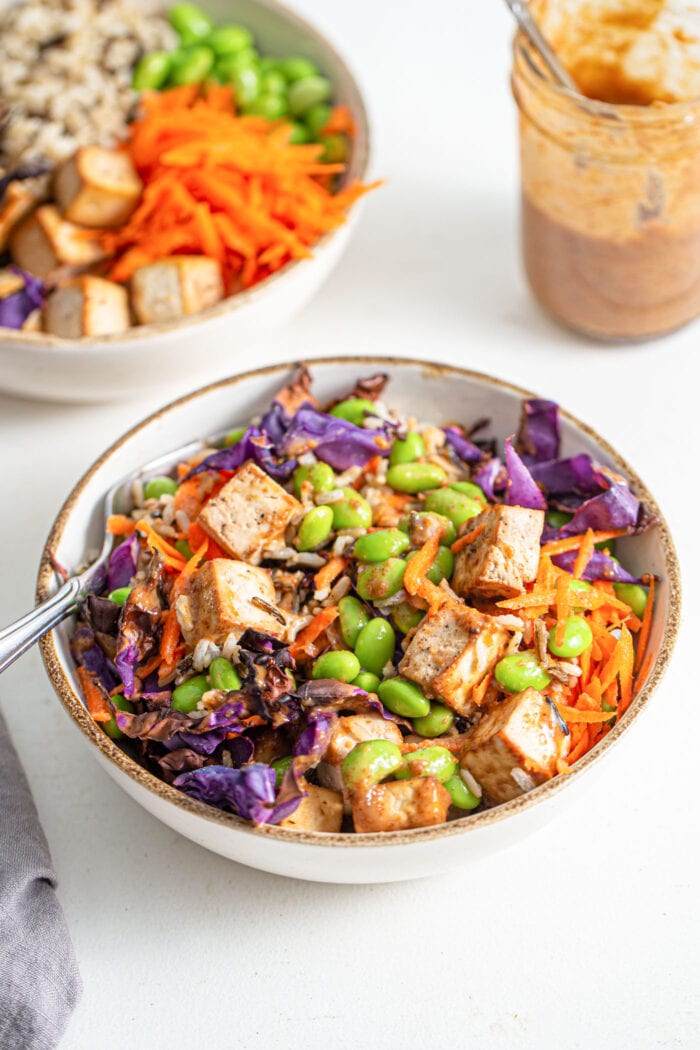
with almond satay sauce.
With a bit of knowledge and effort, getting all the nutrients you need through a well-planned vegan diet is not only possible but also delicious, simple and healthy.
If you’re worried about vegan nutrient deficiencies this post should answer your questions and inspire and encourage you to confidently continue your whole food plant-based journey.
There are a few nutrient concerns if you don’t eat animal products but know that these concerns are more so about not eating enough plants than they are about not eating animals.
The Academy of Nutrition and Dietetics states that an appropriately planned vegan diet is healthful for all stages of life.
They further advise that plant-based diets may provide a variety of preventative health benefits. Of course, as with any diet, a poorly planned vegan diet could be dangerous but the same thing could be said for an omnivore not eating enough whole plant foods.
Why Planning is Essential
Although a vegan diet is considered healthful at all stages of life, I can’t stress enough how important some planning is to ensure you’re getting what you need. Some supplementation is needed, an effort to eat specific foods is needed and some monitoring and self-awareness of your health is needed to make sure you’re staying healthy.
If you plan to eat plant-based long-term, you must take the necessary measures to ensure you won’t be missing any vital nutrients. Use this knowledge as inspiration to make better food choices.
How Much to Eat
I think people can get a little mixed up in this area, some eating far too little and some eating far too much when they first transition to a plant-based diet. Adequate calories are important to make sure you’re getting all the carbs, fats, protein and micronutrients needed to maintain your health.
Eat More than Produce
Fruits and vegetables are very low in calories and aside from starchy vegetables such as potatoes, you’d need to eat massive amounts of them to get enough and although you should most definitely eat lots of veggies, you probably won’t feel very good if that’s all you eat every day.
Legumes and whole grains are denser and will provide a substantial amount of calories and fats are the most calorie-dense and can add up very quickly. When looking at your diet, a good portion of your calories will be coming from carbs with some protein and some fat to make up the rest.
Listen to Your Body
On the other hand, just because a food is healthy doesn’t mean you can eat it in unlimited amounts. For example, if you eat unlimited amounts of nuts and seeds thinking they’re good for you, you may end up eating far too many calories and getting frustrated when you gain weight. That being said, there’s no need to worry too much about this. Our bodies are very smart and if we listen, they’ll tell us just what to do.
These tips should point you in the right direction:
- Eat when you’re hungry.
- Eat until you’re full.
- Drink adequate water all day long.
- Exercise daily.
- Get your carbohydrates from whole grains, legumes, vegetables and fruits.
- Get your fats from nuts, seeds, avocado and coconut.
- Get your protein from whole grains, legumes, nuts and seeds.
- Eat 80-90% whole foods and leave the rest for enjoying life.
To simplify your daily diet, you can download my free printable daily nutrition checklist. This reference covers suggested servings for each food group, such as legumes, veggies, fruits and seeds needed to cover your daily nutritional needs.
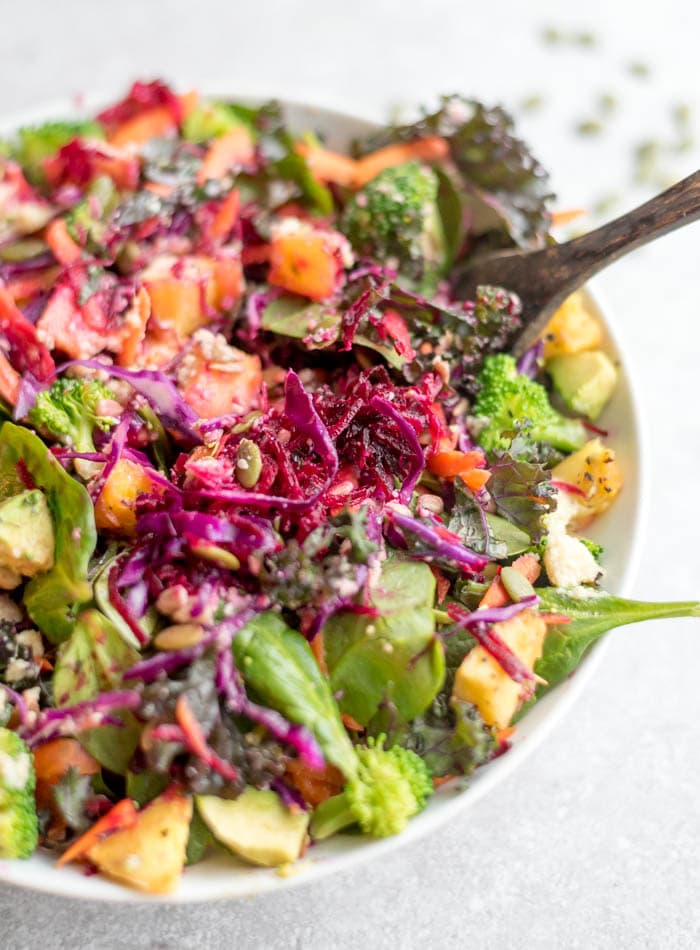
What is a Vegan Diet?
Veganism is the practice of minimizing harm to all animals by abstaining from animal products such as meat, fish, dairy, eggs, honey, gelatin, lanolin, wool, fur, silk, suede, and leather. It is more than a diet, it is a way of living that seeks to exclude all forms of exploitation and cruelty to animals for food, clothing or any other purpose.
Plant-Based vs. Vegan?
Wondering what the difference is between a plant-based diet and a vegan diet? Well, they’re very similar but there do differ a bit. To be vegan means no down comforters, no wool socks, no honey, no gelatin-based candy and of course, no eating dairy, eggs, meat or fish. A plant-based diet, on the other hand, is just about the food.
What is a Plant-Based Diet?
You can pretty much guess what a plant-based diet is all about from the term plant-based. If you eat a plant-based diet you may not necessarily be vegan and you might have other reasons for eating that way than just compassion. For me, it started with compassion and led to health.
As I learned about modern-day meat production, it was clear to me that I couldn’t be a part of it. From there, the more I educated myself on health and nutrition, the deeper my love for plant-based eating grew. The more I learned, the more it re-affirmed my why for eating the way I do.
What is a Vegetarian Diet?
Vegetarians abstain from eating meat and fish but still include other animal products such as eggs and dairy in their diet.
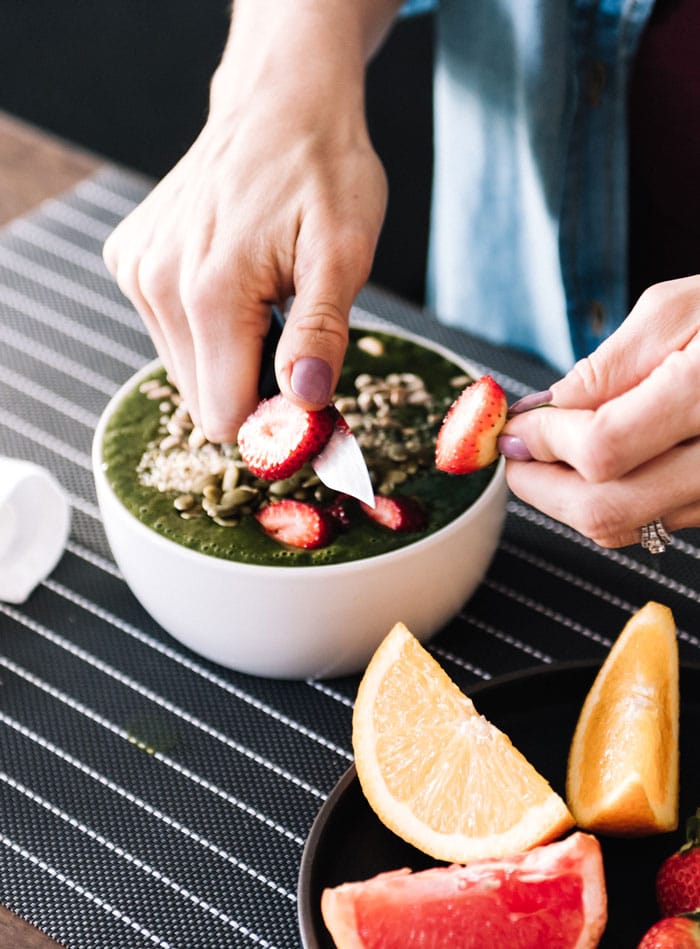
What Do Vegans Eat?
Vegans eat a lot! I know when you’re starting out it might seem like there’s nothing to eat but once you get the hang of it, vegan eating is fun, delicious and healthy. I never feel like I’m missing out on anything.
A vegan diet consists of only plant foods but vegans eat many of the same foods that non-vegans would: pasta, stir-fry, salad, sandwiches, burgers, pancakes, tacos and even pizza.
Basically, anything animal-based can be made vegan. Once you get the hang of some vegan tips and tricks, you’ll be creating plant-based versions of all your favourite dishes in no time.
Vegan Food Groups
A plant-based diet consists of everything but animal products, so the food groups include whole grains, fruits and vegetables, nuts and seeds and legumes. Let’s take a look at each.
Whole Grains
Whole grains is where you’ll find your pasta, bread, rice, quinoa, oats, flours and other whole grains and whole grain products. Whole grains will most likely make up a good part of your diet and provide much of your protein, fibre, complex carbohydrates, vitamins and minerals.
Vegetables
Vegetables should make up a big portion of your diet, for vegans and omnivores alike. They are low in calories yet nutrient, phytochemical and fiber-rich and will cover many of your nutritional needs. The best vegetables to eat daily are dark leafy greens and from there, you’ll want to focus on consuming as many different colours as possible on a regular basis. I always recommend eating at least one salad a day and then sneaking greens into your diet whenever you can by adding them to smoothies, soups, stews and just about everything else.
Fruits
A few servings of fruit per day is a good way to cover even more of your nutritional needs, in particular, to boost your disease-fighting antioxidant intake. Fruit is high in fibre, vitamins, minerals and phytochemicals. You can eat fresh or frozen fruit to take advantage of the many health benefits that fruit provides. Some of the healthiest fruits you can eat are berries, citrus fruits, pineapple, mango and apples but every fruit is a good fruit!
Nuts and Seeds
You will get a lot of the nutrients you need from this food group, in particular, zinc, magnesium, vitamin E, calcium and selenium. Nuts and seeds provide a lot of nutrition and sustenance in a vegan diet. Think almonds, cashews, brazil nuts, pecans, walnuts, sunflower seeds, pumpkin seeds, hemp seeds, chia seeds, flaxseeds and pistachios. You should include a few servings of nuts and seeds in your diet every day.
Legumes
Legumes are a key part of a healthy vegan diet. Legumes such as beans, peas, lentils, peanuts and soy are an excellent source of fibre, protein, iron, calcium, zinc, and B vitamins. Lentils and beans are inexpensive, versatile, taste great and they help to reduce cholesterol and maintain stable blood sugar levels.
Legumes include the soybean which is readily available as edamame, tofu, tempeh and soy milk. By including a variety of legumes in your diet daily, you’ll cover many of your nutritional needs.
What about Oils?
Concentrated fats from oils are not required for optimal health as the essential fats found in them already come from whole food sources. By including avocados, olives, nuts and seeds in our diet we can cover much of our essential fatty acid needs while also taking advantage of other nutrients and fibre.
While a small amount of oil is okay if needed, I would recommend keeping your oil intake to a minimal. Read my post on living an anti-inflammatory lifestyle and gut health for more information.
What about Coconut?
Coconut is unique in the plant world in that it contains a high amount of saturated fats. There’s no need to be concerned about this as long as you watch your portion sizes. The American Heart Association suggests we keep saturated fat intake under 16 grams per day. For plant-based eaters, saturated fats come primarily from coconut and cacao.
I love coconut and eat shredded coconut, coconut butter, coconut milk and coconut flakes often. I rarely use coconut oil but will on occasion for baking or no-bake desserts.
Coconut contains B vitamins such as folate, riboflavin, niacin, thiamin, and pyridoxine and is a source of minerals such as copper, potassium, calcium, iron, manganese, magnesium, and zinc. I also eat cacao quite frequently in the form of raw cacao nibs, dark chocolate and cacao powder. Cacao is rich in potassium, sulfur, magnesium, copper, iron, zinc and magnesium.
Vegan Macronutrient Needs
Vegans need the same macronutrients anyone else would. An appropriate balance of carbohydrates, fats and protein is important for overall health. Typically, around 40-60% carbohydrates, 20-30% protein and 15-35% fat is recommended, depending on your activity level and nutritional needs.
Don’t worry too much about what macronutrients breakdown you need though. The best place to start is to focus on eating a variety of whole foods from each vegan food group. This is the best way to ensure you’ll cover all your needs.
Vegan Athlete Nutrient Considerations
Highly active vegans and athletes, just like non-vegan athletes, may need more calories to support their activity level. Depending on the person and the sport, usually a bit more protein and carbs will do the trick. Some extra protein can help improve recovery and support muscle growth and repair and carbs are needed to fuel the extra activity.
You can check out my post on Vegan Protein Sources for more information on bumping up your protein intake. I would also suggest reviewing my vegan macro guide.
Nutrient Guide
Below getting into all the nutrients to consider if you eat a plant-based diet. In fact, even if you don’t eat a plant-based diet, this still applies. Many omnivores are also deficient in these nutrients, so avoiding animal products is not necessarily the problem.
Not eating enough whole, plant-based foods is more of the issue and before we get into this, know that getting enough protein isn’t going to be a concern. It’s more a matter of regularly eating a wider range of whole plant-based foods to cover all your micronutrient needs.
The top four nutrients vegans should consider are vitamin B12, vitamin D, omega-3 DHA and EPA and iodine. We’ll discuss those as well as calcium, iron, zinc, magnesium, vitamin K, vitamin A and a number of others.
Vitamin B12
Vitamin B12 is synthesized by bacteria found in dirt and soil. It’s a common misconception that it only comes from animal flesh and animal secretions such as eggs and milk. Humans got their B12 by eating soil-grown fruits and vegetables for thousands of years however our soils are so depleted today, it’s no longer an adequate source of B12. We also wash our fruits and vegetables so well today that we aren’t consuming the traces of dirt and soil we used to.
Vitamin B12 is a key nutrient needed for red blood formation, neurological function and DNA synthesis. It is typically suggested that all vegans and plant-based eaters supplement B12.
B12 is the only vitamin that is not recognized as being readily available from whole, plant-based foods and sun exposure. It is very important that all vegans make sure they have an adequate intake of B12. We can meet our needs through a combination of B12 supplementation and B12 fortified foods.
Symptoms of B12 Deficiency
Clinical B12 deficiency can cause anaemia or nervous system damage, however, most vegans get enough to avoid a clinical deficiency. Deficiency symptoms can also include loss of energy, tingling, numbness, reduced sensitivity to pain or pressure, blurred vision, abnormal gait, sore tongue, poor memory, confusion, hallucinations and personality changes. These symptoms are not immediate but rather develop over time before being recognized as a result of B12 deficiency.
How to Get Enough B12
Plant-based eaters can get enough B12 through one of, or a combination of the following methods:
- Eat B12 fortified foods 2-3 times per day.
- Take 10 mg of supplemental B12 supplement daily.
- Take a 1000 mg B12 supplement a couple times a week or 2000 mg once a week.
It should be noted that regardless of diet, everyone over 50 years of age should eat B12 fortified foods and use a B12 supplement due to impaired B12 absorption that occurs with aging.
I use a sublingual B12 spray providing 500 mcg of B12 daily. I also regularly eat tempeh, nutritional yeast and fortified plant-based milks.
Read More: Guide to Tofu and Tempeh
B12 Fortified Foods
B12 fortified foods include store-bought plant-based milks, such as almond and soy milk, fortified nutritional yeast and fortified breakfast cereals. In addition, nori seaweed and tempeh both contain small amounts of bioactive vitamin B12.
Omega-3 DHA and EPA
Note that the RDA is for overall omega-3 fatty acids and there is no recommended daily amount for eicosapentaenoic acid (EPA) and docosahexaenoic acid (DHA). That being said, the American Heart Foundation recommends adults consume 500 mg of DHA and EPA combined per day, furthermore, studies have recommended 1000 mg per day of DHA and 220 mg per day of EPA.
Omega-3 fatty acids are essential for brain health, nutrient absorption and overall optimal health. They also have a healing effect in the body and have powerful anti-inflammatory properties. A lack of omega-3 in the diet can cause brain damage, depression, auto-immune disease, poor digestive health, mood imbalances and more.
Getting DHA and EPA
The main concern on a vegan diet is getting DHA and EPA fatty acids rather than omega-3 in general, as it’s quite easy to get enough ALA, or alpha-linoleic acid from plants. EPA and DHA which are found in animals such as fish, which is where omnivores get the majority of it. Luckily, vegans can take algae-based supplements that contain DHA and EPA, which I would recommend doing in addition to eating omega-3 rich foods such as hemp, flax, chia and walnuts.
Our bodies do convert some omega-3 fatty acids into EPA and DHA however it’s not an efficient process so we still get DHA and EPA through our diet. Additionally, studies have also shown that too much omega-6 blocks the conversion of omega-3 into DPA and HDA and with Americans today over-consuming omega-6 and being deficient omega-3 to begin with, this only furthers the problem.
So, to meet DHA and EPA recommendations, it’s suggested vegans should exceed the RDA for omega-3 while keeping their omega-6 intake low. Omega-6 fatty acids are primarily consumed through oils we use for cooking. Check out my post on an anti-inflammatory diet for more information on the issues with omega-6.
I use a daily vegan algae-based omega-3 supplement with DHA and EPA and I eat plenty of the foods below to make sure I’m covering my omega-3 needs. I also like the Udo’s Oil 3-6-9 Blend with DHA.
Omega 3 Rich Foods
- flaxseed
- walnuts
- hemp seed
- seaweed such as spirulina and wakame
- chia seed
- all other nuts and seeds
- legumes
- winter squash
- cauliflower, broccoli and brussel sprouts
- leafy greens
- berries and mangos
- wild rice
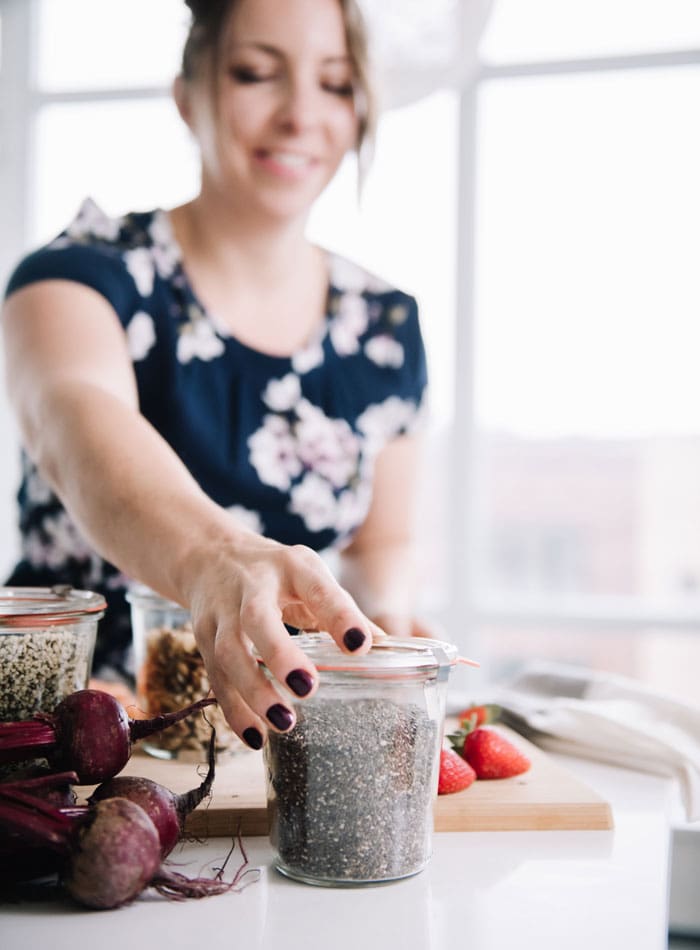
Vitamin K2
Vitamin K plays a role in blood clotting, bone and brain health and kidney function and it is easily found in a vegan diet, so long as you’re eating plenty of fruits and vegetables. Vitamin K comes in a two different varieties. Vitamin K1 is the primary, natural form of vitamin K we obtain through plants and vitamin K2 is produced by intestinal bacteria. K2 is particularly important for its role in bone health as it helps to shuttle calcium around the body to be utilized as needed.
K2 can also help prevent calcium from building up as plaque in the arteries and causing atherosclerosis. K1 deficiency is quite rare but K2 can be a concern as a deficiency could put you at risk for osteoporosis.
Calcium and Heart Disease
Because some healthy adults may be lacking sufficient K2 yet taking calcium supplements, this can actually increase the risk of heart attached or stroke. There are no symptoms for this issue, calcium simply builds up in the arteries when K2 is not present. This is why it’s important to get calcium through your diet rather than overdoing it with a calcium supplement. If you do plan to supplement for healthy bones, you can look at a supplement containing calcium, vitamin D, magnesium and vitamin K2 instead of just calcium.
Since bacteria produce vitamin K2 in our guts, it’s also important to include fermented foods in your diet to promote healthy gut flora. Vitamin K is also fat-soluble so you should include a source of healthy fat when you eat vitamin K rich foods. A small amount of nuts, seeds or avocado with meals should do the trick.
Vitamin K Rich Foods
- brussel sprouts
- fermented soy products (miso and natto)
- cabbage
- kale
- turnips
- broccoli
- okra
- pumpkin
- edamame
- spinach and other leafy greens
- kiwi
- wheat bran
- swiss chard
- parsley
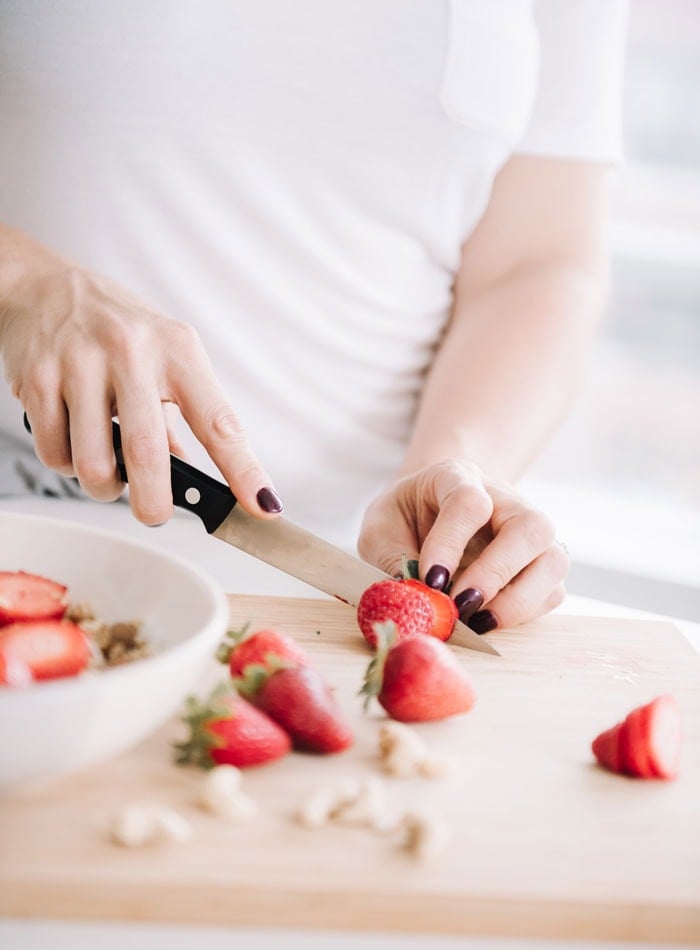
Vitamin A
Note the RDA for vitamin A is measured in retinol activity equivalents or RAE. This is the amount of potential vitamin A activity a food has.
Even though a healthy, vegan diet contains many excellent sources of vitamin A, well, the precursor to vitamin A, it’s still worth covering just to be aware of its importance. Vegans don’t have any preformed vitamin A in their diets as it’s only found in animal products but it can be synthesized from carotenoids found in plants, most notably and most biologically active of which is beta-carotene.
Studies have shown it takes as much as 12 micrograms of beta-carotene to produce one microgram of vitamin A, so it’s important to include really load up on beta-carotene rich foods. Luckily, this is quite easy to do. You should also combine vitamin-A rich foods with fats to improve the absorption. Adding small amounts of nuts, seeds and avocado to all your meals is a great way to do this.
Vitamin A Rich Foods
- sweet potato
- butternut squash
- cantaloupe
- kale
- spinach
- carrots
- apricots
- collard greens
Vitamin D
Vitamin D plays a role in calcium absorption and cell growth. A deficiency in vitamin D is linked to cancer, muscle weakness, depression and weakened bones. Vitamin D deficiency can be a concern for vegans and omnivores alike as we don’t get as much sun exposure we used to.
Vitamin D2 is derived from plant sources while vitamin D3 is derived from either sheep’s wool or lichen. Vitamin D3, or cholecalciferol, is the naturally occurring vitamin D and it is produced by the human body when skin makes contact with direct sunlight. Vitamin D2, or ergocalciferol, is the form found in most Vitamin D supplements.
Not very many vegan foods naturally contain Vitamin D plus, if you live somewhere that doesn’t see a lot of sun during the winter months, vitamin D can be a concern. During the summer months, vitamin D can be obtained through sun exposure with just 20-40 minutes of sun on the face and arms for the body to convert vitamin D.
If you do plan to supplement vitamin D, look for plant-derived vitamin D3. We don’t see much sun here in Vancouver during the Fall and Winter to I use a daily vegan vitamin D3 spray to make sure I get enough.
Vitamin D-Rich Foods
- fortified soy and almond milk
- fortified cereals
- fortified tofu and fermented soy products
- all kinds of mushrooms

Iodine is a trace element needed by the body to produce thyroid hormones, making it important for metabolism and bone and brain development during pregnancy. Iodine deficiency can cause insufficient thyroid hormone production, which among other issues can contribute to autoimmune disease of the thyroid, enlargement of the thyroid gland, or goiter and issues with fetal development. Iodine deficiency is quite common worldwide and is not confined to vegans.
Only a few small studies have found that vegans may have a greater risk for a lower iodine intake than the general population but it’s nothing that can’t be taken care of once you’re aware of the important nutrient. We don’t need much iodine daily so even though there isn’t’ that much found in food, it’s pretty easy to reach the daily recommended amount.
Where to Get Iodine
The most potent sources of iodine are sea vegetables. Just a small amount of kelp, dulse or kombu provides more than your daily requirement. Most other plant foods are not a reliable source of iodine however you will find some in cranberries, potatoes, navy beans and blackstrap molasses. I use kelp flakes in place of salt as a condiment for things like soups, salads and sandwiches and that allows me to easily get enough iodine.
Most salt used in North America is iodized to prevent deficiencies so I wouldn’t say there’s a need to supplement iodine if you live here. However, I would recommend including seaweed in your diet as s source of iodine. Aside from foods, iodized salt is the easiest way to get iodine however it’s important we don’t start consuming excess salt.
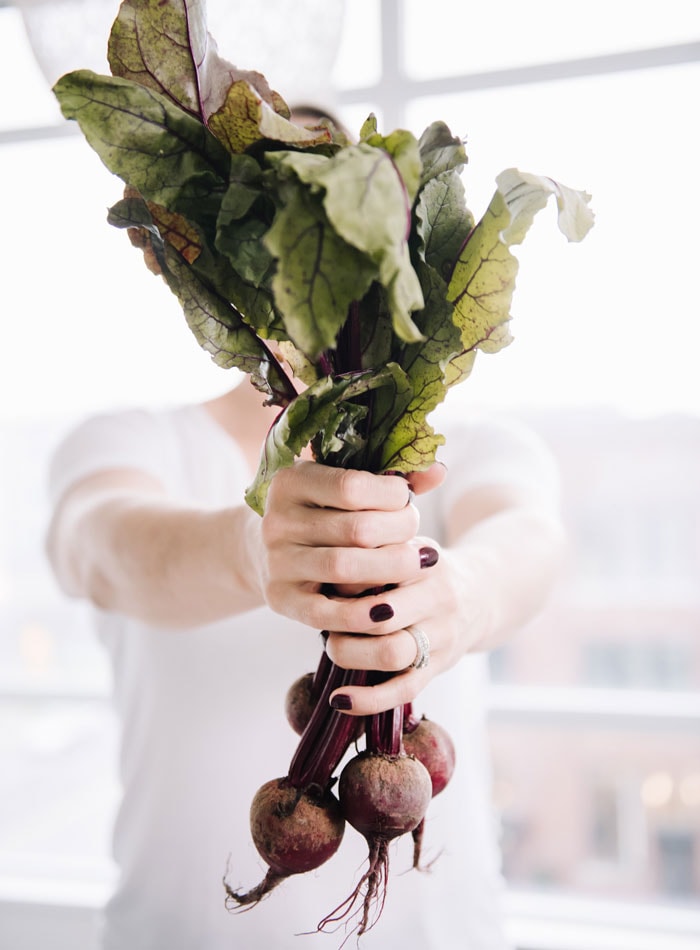
Calcium
Calcium is not too difficult to get in a vegan diet but it’s important to be aware of it and make sure you’re consuming plenty of calcium-rich foods as it’s a key nutrient for overall health. Calcium, along with vitamin D, is an important nutrient for bone health.
Calcium is also essential for muscle and heart function, blood flow, nerve impulses, enzyme reactions and more. A diet rich in calcium is absolutely essential to optimal health and when there are insufficient levels of calcium in the blood, the body will use calcium from bones, weakening them in the process.
Women and Calcium
Women, in particular, should be aware of calcium and vitamin D intake as age-related hormonal changes can cause a decline in bone mass and women just have less bone mass than begin with. We can promote healthy bones through our diet and lifestyle but calcium and vitamin D intake is a particularly important part of that.
Factors Affecting Calcium Loss
There are a number of factors that contribute to calcium loss in particular high-protein diets, diets high in sodium, high caffeine intake and smoking cigarettes. If you regularly eat the foods below and avoid these habits that may decrease, you should be covered for your calcium needs. If you’re concerned, work with a health care professional to determine if supplementation is needed.
Calcium Fortified Foods
As for getting calcium from fortified foods, I see no reason not to take advantage of it. We don’t have to rely on them but they can be helpful to fill in gaps as needed. Store-bought milk, both cows milk and plant milk are fortified with vitamin D and calcium.
Adding just 1-2 servings to your diet daily can daily cover your calcium needs. This is why I often opt for store-bought plant milk over homemade. I love homemade plant milk and make small batches often but I always have store-bought almond milk on hand to easily cover my calcium needs.
Calcium Rich Foods
- collard greens
- dried figs
- tempeh
- kale
- turnip and mustard greens
- sesame seeds and tahini
- quinoa
- tempeh
- blackstrap molasses
- almonds
- bok choy
- broccoli
- beans
- seaweeds such as kelp and wakame
- almonds and almond butter
- fortified plant milk and juices
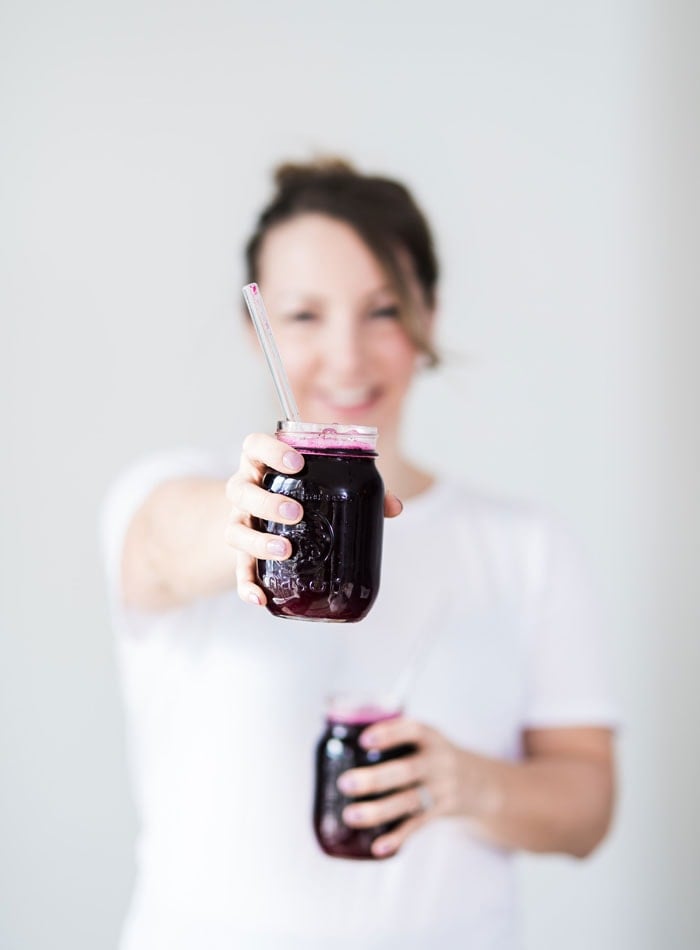
Zinc
I find it easy to get adequate amounts of zinc but it’s still important to plan for this essential mineral. Zinc deficiencies can result in hair loss, a weakened immune system, hormone imbalance and acne. Zinc is important for carbohydrates metabolism, testosterone production, healthy eyes, skin and nails, a strong immune system and healing. You can achieve your daily zinc needs through whole foods by including plenty of the foods listed below.
Bioavailability of Zinc
Note that it’s suggested vegans should increase the RDA of zinc by as much as 50% to account for the phytates in grains and legumes decreasing nutrient absorption. You can soak and/or sprout your legumes, nuts and grains to remove some of the phytic acid to improve the bioavailability of zinc and other nutrients.
Zinc Rich Foods
- legumes such as tofu, edamame, tempeh, kidney beans, black beans, chickpeas, lentils and peanuts
- raw cacao nibs or powder
- nuts such as walnuts, cashews, pecans, pine nuts and almonds
- seeds such as hemp seeds, chia seeds, pumpkin seeds and sunflower seeds
- oats
- wheat germ
- nutritional yeast
- fortified cereals
Magnesium
Magnesium is an essential mineral that is a part of over 300 processed in the body. Luckily, plants are loaded with magnesium so it’s quite easy to get enough through a healthy diet. Magnesium plays a role in mood, weight, sleep, digestion, heartbeat, energy, metabolism and can even affect PMS and depression.
Magnesium also helps regulate the nervous system, blood pressure and even reduces our risk of heart attack and stroke. Magnesium deficiency is quite common today, not just for vegans, so make sure you’re including plenty of magnesium-rich foods in your diet.
Magnesium Rich Foods
- kelp
- banana
- dried figs
- leafy greens
- broccoli
- legumes
- whole grains especially oats
- cacao
- almonds and cashews
- hemp, chia, pumpkin and sunflower seeds
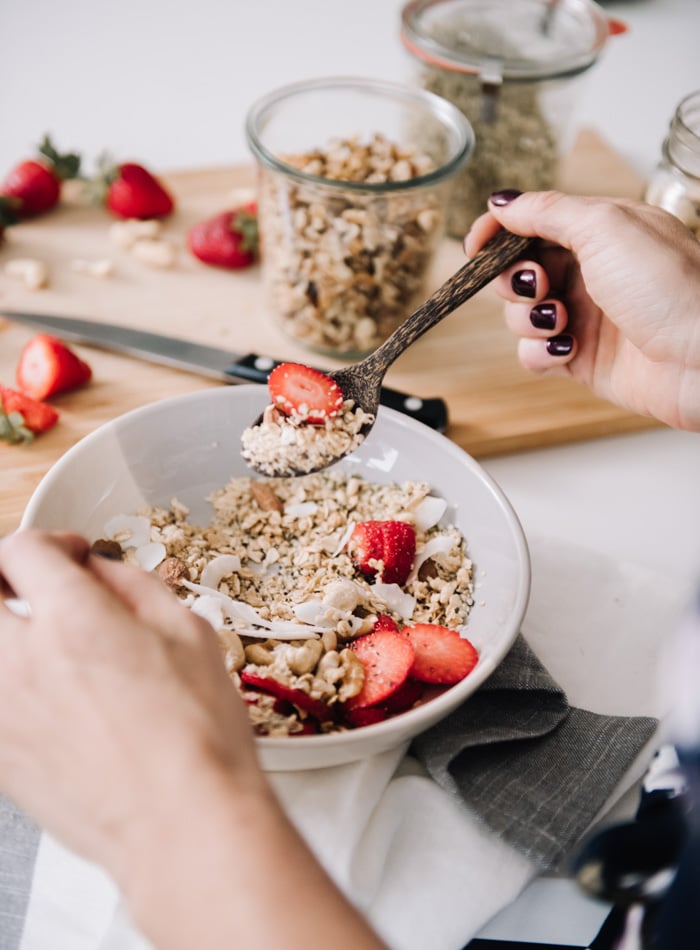
Iron
Iron is important in the body for energy production, immunity and DNA synthesis. I find iron one of the easiest nutrients to get enough of on a vegan diet and I easily get enough through eating whole foods. It’s important for vegans to eat iron-rich foods daily along with plenty of vitamin C, which aids in iron absorption.
Improving Iron Absorption
If you’re healthy and eat a whole food, plant-based diet, there’s no need to be worried about iron however iron absorption is something to be aware of. We can improve iron absorption by:
- eating vitamin C-rich foods such as bell peppers, broccoli, cabbage, oranges, strawberries, kiwi, camu camu, pineapple, brussel sprouts and grapefruit with meals
- avoiding tea and coffee at meals as they can reduce absorption
- eating more legumes such as peanuts, beans, lentils and peas
- cooking in a cast iron skillet
Athletes and Iron
Iron deficiency can impair muscle function and limit work capacity so it’s important that athletes ensure they’re getting an adequate iron intake. The average requirement for iron may be 30-70% higher for athletes engaging in regular, intense endurance exercise. If you’re an endurance athlete such as a long-distance runners, and in particular female and adolescent runners, you may want to work with a nutritionist to determine if iron supplementation is needed.
Iron Rich Foods
- fortified whole grain cereal
- molasses
- lentils
- spinach
- kidney beans
- garbanzo beans
- tempeh
- edamame
- pinto beans
- almonds
- sunflower seeds
You’ll also find iron in pistachios, collard greens, oats, walnuts, tofu, sweet potato, kale, broccoli and peanuts. There’s no need to stress over combining vitamin C and iron as it will happen naturally if you eat a range a whole, plant-based foods at every meal, it’s just something to be aware of.
More Reading: Vegan Iron Sources
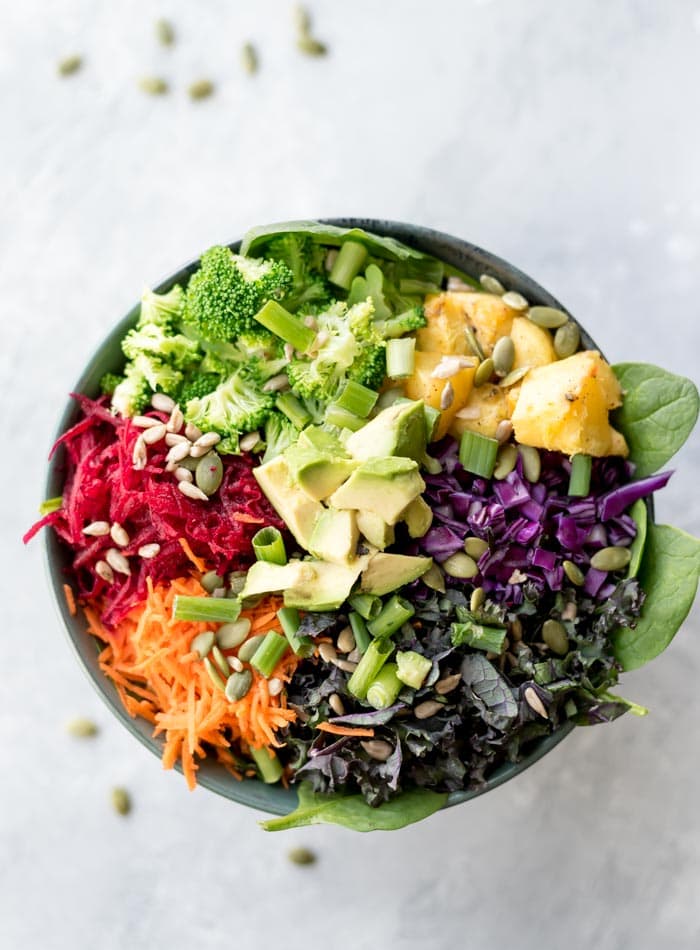
Sulfur
Sulfur is not commonly brought up as a nutrient concern and in fact, there is no RDA it although it is important for optimal health. Sulfur helps improve the absorption of protein and enzymes from food and acts as an antioxidant helping to fight cancer. A sulfur deficiency can cause bone loss, a sluggish metabolism, joint pain, blood clots and tissue damage.
Most dietary sulfur is found in the amino acids present in animal products but there are a few plant-based sources of you can include in your diet to make sure you get enough.
Sulfur-Rich Foods
- coconut oil
- olive oil
- kale
- garlic
- onions
- asparagus
- legumes
MSM Supplementation
You may also want to consider supplementing with MSM, or methylsulfonylmethane, if joint pain, inflammation, fatigue, stress and lowered immunity are an issue. MSM is the oxidized form of dimethyl sulfoxide (DMSO), an organic sulfur compound from lignan. It’s an organic sulfur-containing compound that’s used to improve immune function, lower inflammation and help restore healthy bodily tissue.
MSM is also a popular joint health supplement. It also naturally occurs in some green vegetables and other food products. MSM may be particular useful for athletes to help reduce muscle pain, improve recovery after exercise, reduce fatigue and support mood.
Other Considerations
There are a number of other nutrients that vegans may want to consider on an individual basis as they’re not found in any plants. I did a ton of research on this and from what I understand supplementation is not necessary with the possible exception of high-level athletes and those concerned with athletic performance.
“So there’s a number of nutrients carnitine, carnosine, taurine, creatine that are not made by plants, then you say ‘Uh oh! That’s all I eat, what do I do? They’re only made by animals’. Well, guess what? You’re an animal, right? And we make it just like the cow makes it that people eat, we make it too, we’re animals too, and so we make all the carnitine we need just like the cow does.”
Dr. Michael Greger
So basically, no, none of these nutrients are found in plants but they can all be produced by the body and do not need to be obtained through our diet. By consuming a wide range of plant-based protein sources to cover all the essential amino acids, we can naturally synthesize these compounds without the need for consuming animal protein.
Let’s take a quick look at them either way.
Creatine
The benefits of creatine include anaerobic endurance, increased strength and possible improved cognitive abilities. Creatine won’t actually build muscle itself but it can help you improve strength by allowing you to train harder for longer. Most creatine is created synthetically and 100% vegan however capsules can contain gelatine, so check with the brand you’re using if you’re unsure. Is creatine necessary to supplement? Absolutely not, however, it can be considered on an individual basis if a high-level of athletic performance is a concern.
Carnosine
Carnosine is a dipeptide made up of amino acids L-histadine and beta-alanine. Carnosine acts as an antioxidant in the body, most importantly it prevents glycoselation, a factor contributing to aging, inflammation and other negative health implications.
Carnosine is synthesized in animal tissues and not found in plant foods. There hasn’t been much research on carnosine supplementation and it doesn’t seem that it’s necessary until more is known however supplementation may have some positive benefits for athletes.
Beta-Alanine
Beta-alanine, a non-essential amino acid produced in muscle tissue, has been shown to enhance muscular endurance and delay fatigue. The body can produce beta-alanine in various ways such as during the breakdown of carnosine or conversion of L-alanine to pyruvate. It can also be produced when you eat animal products.
Once ingested, it’s converted to carnosine and contributes to intracellular buffering, which helps to delay fatigue during high-intensity activity. Basically, this means you can go harder for longer when training.
Carnosine is present in muscle tissue and thus found primarily in meat products, leaving vegetarians with fewer sources compared to meat eaters. Supplementing with beta-alanine may increase carnosine concentrations, enhancing your training by increasing your work capacity and ability to handle more training volume.
Beta-alanine is the limiting amino acid for carnosine synthesis and beta-alanine supplements have been shown to increase muscle levels of carnosine. Now Foods makes a vegan beta-alanine supplement if you’re interested. I would recommend talking to a nutritionist or other professional to see if beta-alanine is something that may help you from an athletic performance standpoint.
Taurine
Taurine is essential for a healthy brain and heart, it boosts antioxidant activity in the body, improves muscle function, contributes to healthy eyes and a healthy central nervous system.
Taurine is not essential since the body can produce taurine through a combination of cysteine, vitamin B6, methionine and vitamin C, however, studies have shown vegans do have lower taurine levels than meat-eaters. To obtain adequate levels of these nutrients needed to produce taurine, we should eat red peppers, garlic, onions, broccoli, brussel sprouts, oats, whole grains, brazil nuts, seeds such as sunflower and sesame and other various vegetables.
Taurine is not typically supplemented unless there is an individual need for it however it’s important vegans eat soy, hemp seed, quinoa, buckwheat and amaranth on a regular basis, along with the foods above, to ensure they’re synthesizing adequate taurine from the amino acids found in these foods.
Carnitine
Carnitine is used in the transportation and metabolization of fatty acid and is synthesized naturally in the body from the amino acids lysine and methionine. By ensuring adequate intake of amino acids we can make sure we have what we need to produce carnitine. Lysine is found in whole grains, legumes, tempeh, pistachios, soy milk and pumpkin seeds and methionine is found in sesame seeds, brazil nuts, oats, sunflower seeds, spinach and potatoes.
Protein Deficiency Myth
People are so concerned about not getting enough protein on a vegan diet but it’s just not an issue. I’d be more concerned about not eating enough plants and being deficient in many of important nutrients plants contain. You never hear of anyone having a protein deficiency. B12, vitamin D, magnesium, zinc, iodine…sure, but that’s not limited to vegans.
These are common nutrient deficiencies that are due to eating too many processed foods and not enough whole plant foods. The Standard American Diet is to blame for that, not a lack of animal products in the diet and in fact, we’re now over-consuming saturated fats, cholesterol, sodium and omega 6 fatty acids more than ever before. Furthermore, a whopping 97% of Americans don’t get enough dietary fibre and how do we get more fibre in our diets? Through eating plants, of course!
Read my post on vegan protein sources for more information on how to get enough protein on a plant-based diet.
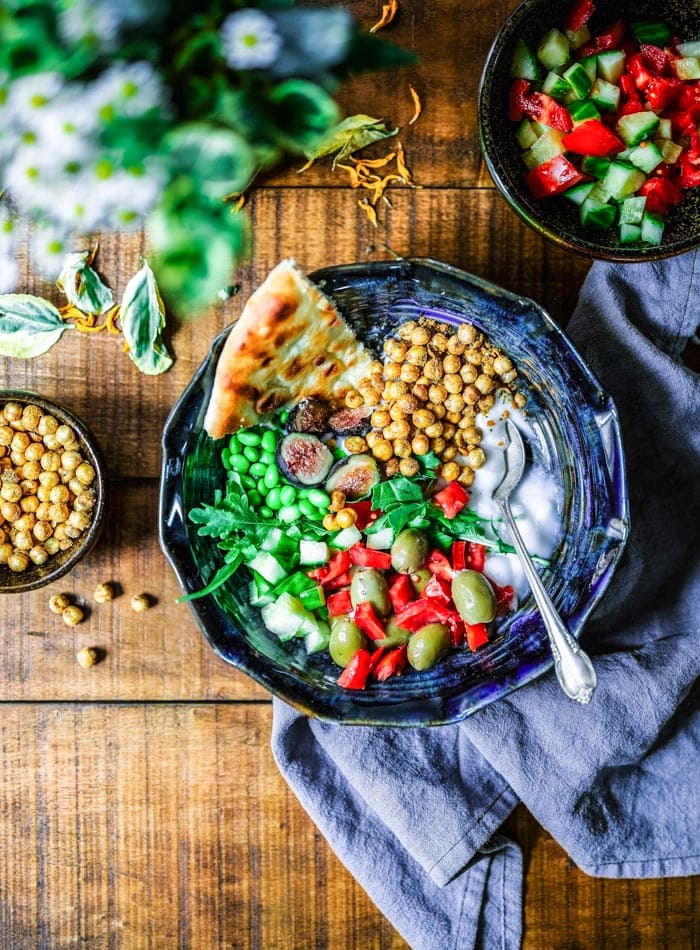
What about Supplements?
Eating a healthy, balanced vegan diet including a wide range of foods with enough calories to support your activity level should ensure you’re getting enough protein, iron and calcium. However, it’s very important to make sure you’re including sources of vitamin B12, vitamin D and iodine.
You can reach the RDA for these nutrients through a mixture of whole foods, fortified foods and if needed, supplements. Try your best to eat a nutrient-rich diet but a good vegan multi-vitamin will help fill in any holes for those days when you may not eat as well as you should be.
You shouldn’t have to take much in the way of supplements but you can work with a nutritionist or medical doctor to determine what you may need. With the exception of B12 and some planning and awareness, you can get everything you need from foods.
Supplements I Use
That being said, I’ve listed the supplements that I use below. This is completely personal and is what I’ve decided to supplement through my own research and personal experience. You could definitely just take one quality multi-vitamin and a DHA/EPA supplement, this is just what I’m using right now.
- Vitamin B12. I use a 500 mg sublingual B12 spray about once a week but I eat fortified foods like store-bought plant milks and nutritional yeast so I don’t worry too much about it.
- Magnesium. I take 400 mg magnesium at night before bed.
- Vegan Vitamin D3. I take this daily during Spring, Fall and Winter when we don’t get much sun here in B.C.
- Omega-3 with DHA and EPA. I take 1 tsp of Ascension NutraVeg daily.
I sometimes take zinc and vitamin C but I mostly just try to focus on eating a wide range of colourful foods to cover my micronutrient bases.
I love “superfoods” spirulina, chlorella, moringa, camu camu, cacao and take various adaptogens depending on the time of year and what I have going on. Herbs and teas are also wonderful. I love blue vervain, amanu, spanish need, nettle, burduck and plenty more.
I like maca, ashwaganda, rholioda, reishi, cordyceps and chaga for hormone, mood, immunity and stress support. You can read more on that in my post on adaptogens.
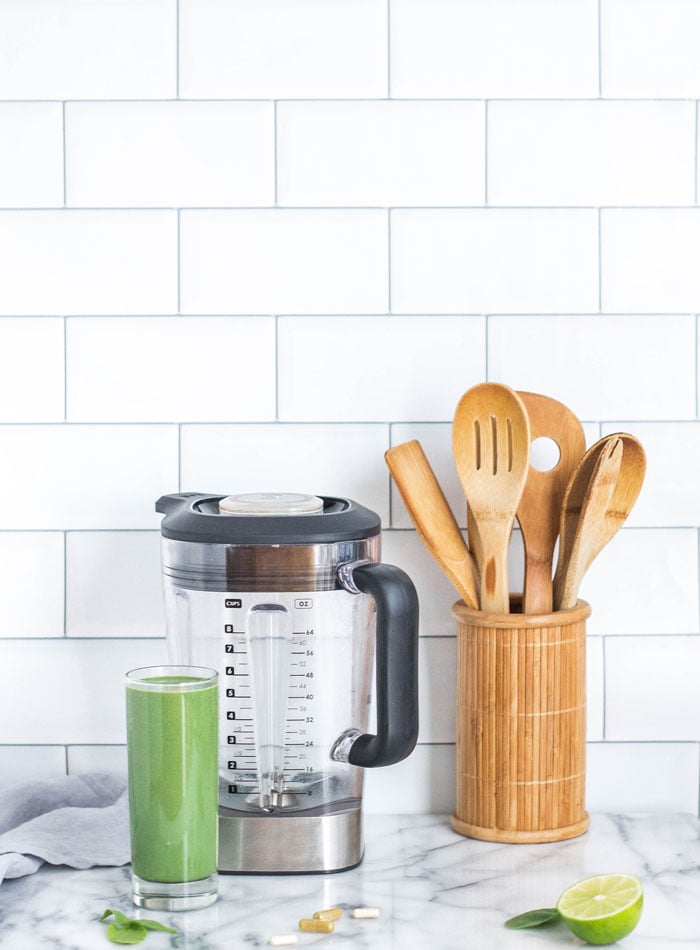
Food Synergy
Supplements have their place, they’re meant to supplement a healthy diet and act as insurance, however it’s very important that you regularly eat as many different whole plant foods as you can. There is a powerful concept called food synergy and basically, it says that the health benefits of eating whole foods can’t be explained by the benefits of any one specific nutrient in those foods.
For example, in one study it was found that a diet rich in whole grains did, in fact, reduce mortality from all causes but it was found that there were additional benefits to eating whole grains that none of the nutrients alone or even together could explain.
The study suggested there was something else in whole grains that protects against death, suggesting that the parts all acted synergistically. This is when researches began to pay attention to food synergy, or the idea that a whole food might be more than the sum of its nutrient parts.
I hope this vegan nutrition guide pointed you in the right direction. There is so much power in what nature has already developed for us. Eat a lot of whole foods, supplement as needed and monitor your health to make improvements if necessary.
As long as you remain healthy, there is no reason why you can’t enjoy a whole food plant-based diet for the long-term and feel great while doing it.

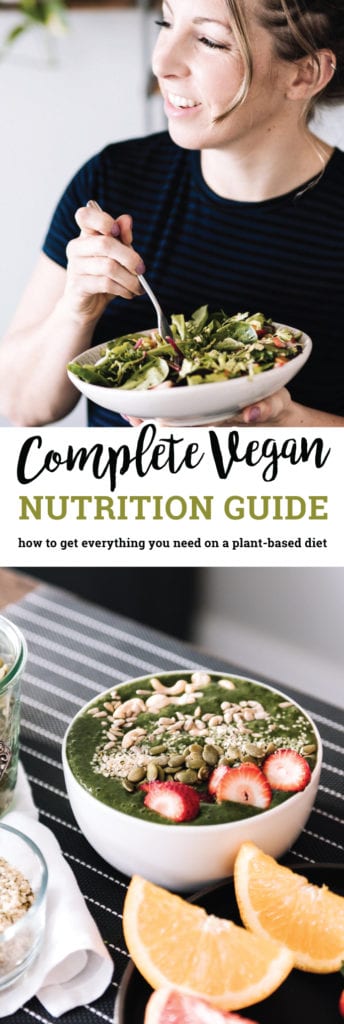

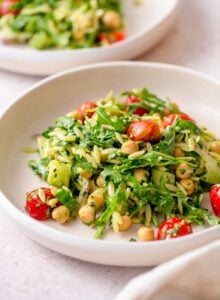
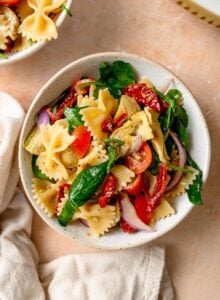
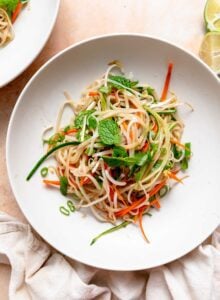
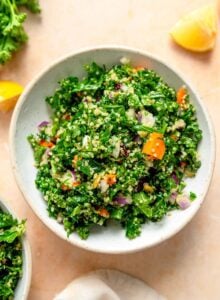
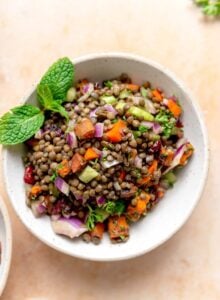
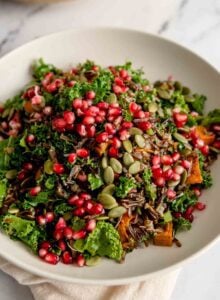
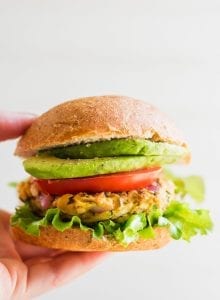
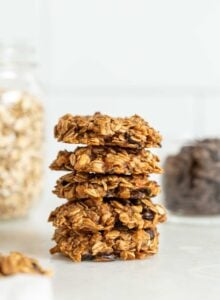
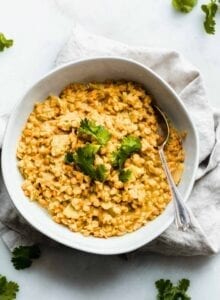
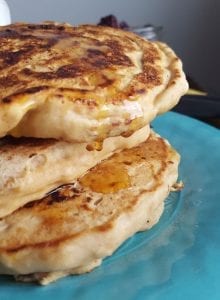
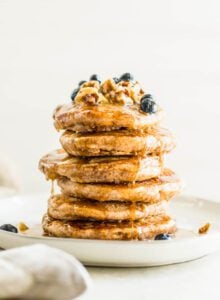
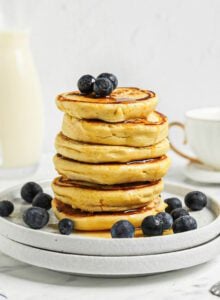
Hello Deryn, thank you for your terrific resource, just increasing my families number of meat free meals and stumbled across your site through a recipe. Is your bundle of resources still available as a free download by any chance, I did input my email address a day or two ago and clicked the link but haven’t received anything as yet. Thanks for many inspiring ideas, much appreciated. Best wishes Caroline
Did you check your spam folder? It would have sent immediately! Let me know and if it’s not there I will send to you today. Thanks!
Hi Deryn, phenomenally good work, I’m a vegan of 10 years, never knew of sulfur… May i ask why do you supplement with B12 when there is far in excess of the RDA in nutritional yeast? Also you make no specific info about Cysteine, which is the hardest amino acid for vegans to get?
Hi! I actually don’t supplement B12 anymore. I get enough through fortified foods and have had my levels tested a few times. I can add a section on cysteine but it’s not hard to get enough of eating a wfpb with lots of legumes, nuts and seeds. Thanks!
Hi Deryn,
I am having trouble downloading the free daily plant-based nutrition checklist. Can you send it to my email? Thank you!! I love your website!
Seriously great post!
I found myself a great source of energy in CoQ10 and been taking those every day and I feel great. Before I had some days when I was a bit slower and I feel it was my mistake – I combined my foods poorly, but now I don’t have those problems anymore. And I’m really curious about all these spray-vitamins, I’ll have to try it, really wanna check how those work 🙂
This is great! I have been plant based/vegan since August of last year, and this post is really informative. Even eating this way for so many months I still have weeks where i struggle and don’t make the best choices. Finding your blog has made my day today! i love how you write, and how you give the information without a lot of fluff. 🙂 I will definitely be able to take some time and read through your posts, and get myself back on track!
Thanks!
Thank you, Kate! Your comment my day! If I can help just one person, I can’t tell you how happy it makes me. I’m so glad you found this post helpful. Wishing you the best in your health journey, YOU GOT THIS!! xo.
This is an AMAZING resource! I can’t believe how much useful information you packed into one post!
Thanks, Steph. Glad you found it helpful.
How informative! I’m not vegan, but I have done a few 30 day vegan challenges as I am always trying to incorporate more plant based alternatives into my diet!
Glad you found it helpful, Maria!
I was as slim as a railroad track when I was 90% Vegan. I ate Tuna sandwiches and Oranges. I learned as I age, my weight is affected. I may look into partial Veganism again.
Oh my lord, this must have taken you forever to write!! Thank you, this was all really good information. Some of it I knew and some was learned, it was a helpful reminder to reorder my B-12 supplements too! New and seasoned vegans should all read this.
Thanks, haha…it did take a while but I chipped away at it over time! I’m glad I finally posted it 🙂 Thanks for the feedback!
Awesome post! You answered a lot of my questions about supplements and I learned about MSM, which I will be taking daily now! Thank you!!!
Thanks, Sarah! Glad you found it helpful!
Hey Deryn! A quick question – how many mg of MSM do you take? I bought 1000 mg capsules and so far have been taking half. I’ve read a bunch of different dosage suggestions so just wondering what you suggest! Thanks!
I was taking 1000 mg when I was dealing with some injuries but now I’m taking 500 mg daily. From what I’ve read, 500 mg is good as an insurance protocol but specific health conditions can require 1000 mg or much more.
Ok, yes, I’ve read about the same as well but other sites were suggesting more. Plus, even the bottle says to take 1000 mg up to 3x daily. I thought that would be a bit much for me, lol. Thanks again!!!